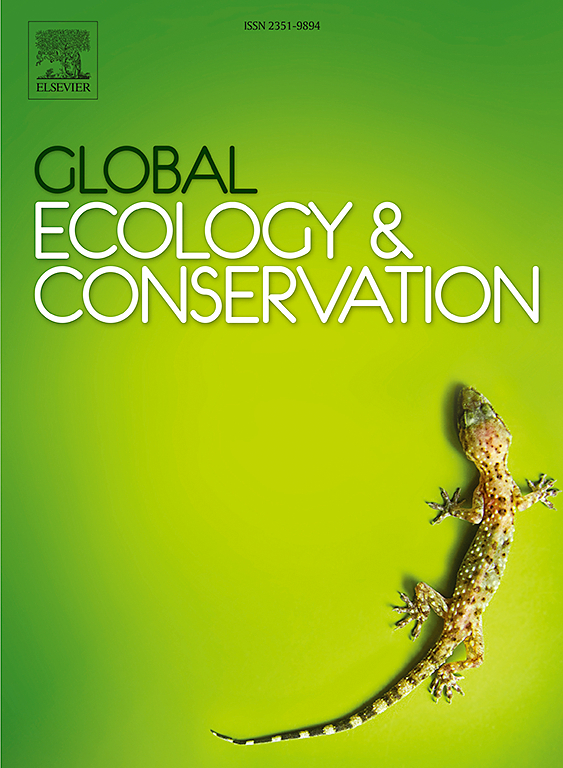Applying the driver-pressure-state-impact-response model to ecological restoration: A case study of comprehensive zoning and benefit assessment in Zhejiang Province, China
IF 3.5
2区 环境科学与生态学
Q1 BIODIVERSITY CONSERVATION
引用次数: 0
Abstract
Ecosystem degradation is a global problem that poses a significant threat to the sustainable development of human societies, particularly in developing countries, such as China. In response, China has implemented a series of ecological restoration (ER) policies over recent years. However, significant regional developmental disparities, pronounced spatial heterogeneity of ecological issues, and substantial historical debt for ER in China present considerable obstacles and financial burdens to the effective implementation of ER strategies. Delineating ER zones and assessing the ER benefits are essential for developing effective ER strategies and implementing ER projects. In this study, we constructed a comprehensive framework for ER utilizing the Driver-Pressure-State-Impact-Response (DPSIR) model, quantified the urbanization levels, ecological state, and restoration costs in Zhejiang Province to delineate ER zones, integrated the patch-generating land use simulation model with the ecosystem service value assessment method to quantify the benefits of ER, and ultimately developed tailored ER strategies. The results showed that: (1) The pattern of urbanization levels was characterized by high levels in the northeast and low levels in the southwest, which constrated with the ecological state. The areas of high restoration costs were located in the northeastern and southeastern regions, and the areas of low restoration costs were situated in the southwestern region. (2) The rate of construction land expansion is significantly curtailed under the ER scenario compared to the natural development scenario in 2035, while forest areas have seen effective protection and an increase from the levels of 2020. (3) The ER policy is projected to generate ecological benefits totaling CNY 8.23 billion by 2035, substantially reducing the rate of ecosystem degradation. (4) Zhejiang Province is divided into five zones at the county scale: ecological autonomous protection zone, ecological core protection zone, ecological priority restoration zone, ecological control zone, and moderate development zone. Strategies have been devised based on the forecasted benefits of ER, offering valuable insights into ecological management. These findings aim to enhance the understanding of ER and support the development and implementation of regional ecological policies.
将 "驱动力-压力-状态-影响-响应 "模型应用于生态恢复:中国浙江省综合分区与效益评估案例研究
生态系统退化是一个全球性问题,对人类社会的可持续发展构成重大威胁,尤其是在中国等发展中国家。为此,中国近年来实施了一系列生态修复(ER)政策。然而,地区发展差异大、生态问题的空间异质性明显以及中国在生态恢复方面的历史欠账多等问题,都给有效实施生态恢复战略带来了巨大的障碍和经济负担。划定环境退化区和评估环境退化效益对于制定有效的环境退化战略和实施环境退化项目至关重要。在本研究中,我们利用驱动因素-压力-状态-影响-响应(DPSIR)模型构建了一个综合的环境再造框架,量化了浙江省的城市化水平、生态状态和恢复成本,从而划分了环境再造区,并将斑块生成土地利用模拟模型与生态系统服务价值评估方法相结合,量化了环境再造的效益,最终制定了有针对性的环境再造战略。研究结果表明(1) 城市化水平呈现东北部高、西南部低的格局,这与生态状况相吻合。修复成本高的地区位于东北部和东南部地区,修复成本低的地区位于西南部地区。(2)与 2035 年的自然发展情景相比,ER 情景下的建设用地扩张速度明显下降,而森林面积得到有效保护,并在 2020 年的基础上有所增加。(3) 预计到 2035 年,ER 政策将产生 82.3 亿元人民币的生态效益,大幅降低生态系统退化率。(4) 浙江省在县域范围内划分为五个区域:生态自主保护区、生态核心保护区、生态优先修复区、生态控制区和适度发展区。根据 ER 的效益预测制定战略,为生态管理提供有价值的见解。这些研究结果旨在加深人们对生态恢复的理解,支持区域生态政策的制定和实施。
本文章由计算机程序翻译,如有差异,请以英文原文为准。
求助全文
约1分钟内获得全文
求助全文
来源期刊

Global Ecology and Conservation
Agricultural and Biological Sciences-Ecology, Evolution, Behavior and Systematics
CiteScore
8.10
自引率
5.00%
发文量
346
审稿时长
83 days
期刊介绍:
Global Ecology and Conservation is a peer-reviewed, open-access journal covering all sub-disciplines of ecological and conservation science: from theory to practice, from molecules to ecosystems, from regional to global. The fields covered include: organismal, population, community, and ecosystem ecology; physiological, evolutionary, and behavioral ecology; and conservation science.
 求助内容:
求助内容: 应助结果提醒方式:
应助结果提醒方式:


